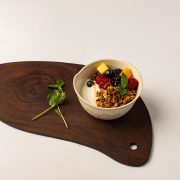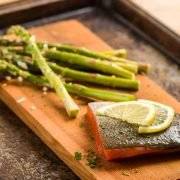7 Crucial Healthy Eating Tips and 5 Easy Nutrition Tips
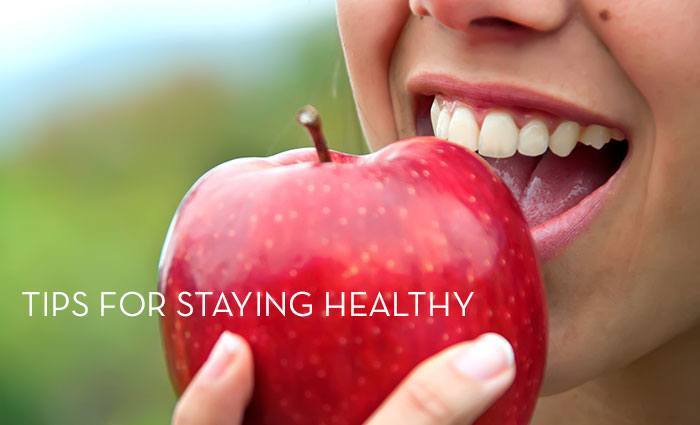
Wake up groggy – Coffee – Commute to office – Coffee – Quick lunch at desk – Chocolate/Coffee to spike low energy – Commute home – Huge dinner – Watch TV – Sleep – Wake up groggy
Sound familiar? This vicious cycle can be a hard one to break. Perhaps you’ve tried diets or removing certain food groups from your meals in order to lose weight and be energized throughout your day. Or maybe you’ve swung the other direction and are addicted to certain foods and can’t get through a day without them. Like coffee for example.
Let’s take a step back and look at the types of food you’re eating, and how you’re consuming them. Our modern-day culture stresses what kinds of food to eat, but few are concentrating on meal timing. How, and when you eat also has an impact on your overall health. It’s more important than ever to stress some key healthy eating tips
7 Crucial Tips for Healthy Eating
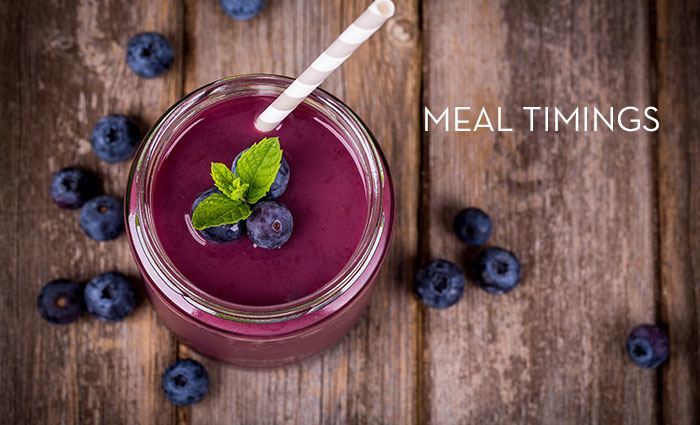
Meal Timings
1. Eat Breakfast Within 30 Minutes of Waking
If you take nothing else away from this article, remember one thing: eat breakfast within 30 minutes of waking up. Even if it’s just an Energy Smoothie. With the prevalence put on coffee these days, most of us wake up and have a cup of joe–or several. And, because caffeine is an appetite suppressant, we go the entire morning without eating. The problem with this scenario is your body reacts by thinking it’s being starved and builds up fat cells. Fall into a habit of this and quite quickly it becomes too hard to shed weight because the body is always worried about when the next meal will come. The simple solution is to eat some form of food within a half-hour of waking. After breaking your fast first-thing in the morning, you will:
- Kick-start your metabolism for the day
- Be supporting your circadian rhythm and will have more energy
- Keep your liver from initiating the “famine” response
We know that a warm cup of coffee is very comforting, especially as the cold weather settles in, but consider trying alternatives like ginger tea, which helps cleanse the liver rather than tax it, or perhaps a barley-based coffee substitute like Bambu or Akava. At the very least, try lessening your coffee intake by just have one a morning after your first meal or smoothie.
2. Eat two-thirds of your food in the first nine hours of the day
This is an issue that’s especially prevalent in North America where we tend to consume coffee during the day and then have a huge meal right before we watch TV and fall asleep. The issue with this scenario is the body doesn’t have the ability to work off all those extra calories while sleeping so it tends to store them all as fat. By eating most of your food during the first half of your day you:
- Allow your body to burn off those calories by walking and being active
- Reduce your evening blood sugar levels so insulin doesn’t store the excess as fat
This may seem difficult to do at first because large dinners can seem so satisfying, but just try it for a little while and we’re positive your energy levels will increase in the morning.
3. Eat Every 3 hours
Not only will you benefit from eating within the first nine hours of your day, but you will also feel better if you consume multiple food groups every three hours. By snacking regularly you convince the body you’re not starving and it will be less likely to store fat. Let’s preface this, however, by saying that a snack does not include an entire bag of Doritos. All you need is a piece of fruit and a handful of seeds or nuts or any of our top 5 on-the-go-snacks to keep your energy up. And by eating throughout the day you will:
- Maintain level blood sugar and avoid insulin spikes in response to large meals
- Avoid the “famine” response that results in fat storage from skipping meals
- Avoid energy drops associated with low blood sugar that tends to have us craving coffee, chocolate, or another caffeine source
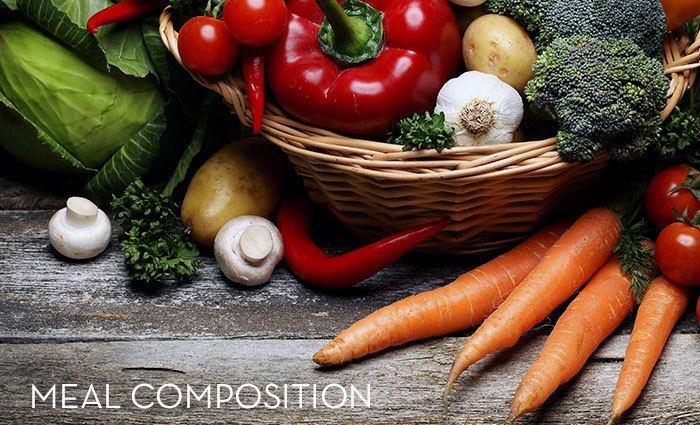
Meal Composition
As mentioned above, meal timing is important. But we also must consider what food, and how much of it, we consume.
It’s crucial to combine multiple food groups at each meal and snack. So whether you get your protein from meat, beans, or certain leafy greens, you should be eating it at every meal. Avoid store-bought protein bars, which contain empty calories among other things. Try our delicious homemade protein bars instead.
Along with your protein, be sure to include complex carbohydrates, vegetables, and fruit. Think slow-cooked oatmeal, not white bread, and most cereals that consist of refined sugars and simple carbohydrates.
We should also stress it’s important to include a wide variety of local, fresh, organic, and unprocessed foods. Stay away from the center aisles at the grocery store. And if you’re eating animal protein, choose organic, wild, or free-range that are free of hormones and antibiotics. Here is how we break down our meals at Mountain Trek:
4. Equal Volumes at Breakfast
At breakfast, we recommend equal volumes of complex carbohydrates, protein, vegetables, or fruit. As well as a teaspoon of omega oil and a small amount of dairy (substitute if you’re allergic or have an intolerance). By combining these items you benefit by:
- Supporting a “glycemic load,” which contributes to a longer, slower release of blood sugars and avoiding insulin spikes
- Getting important minerals, vitamins, and phytochemicals, which do the body wonders especially first thing in the morning
- The high fiber from complex carbohydrates provides chromium to help regulate blood sugars and it creates a sense of fullness, lowering appetite
5. Two-Thirds Vegetables at Lunch
Your lunch should be two-thirds vegetables and one-third protein with a small dairy component or substitute.
6. One-Half Vegetables, One-Quarter Protein, One-Quarter Complex Carbs at Dinner
Your dinner plate should be one-half vegetables, one-quarter complex carbohydrates, and one-quarter protein with a small dairy component or substitute. This is because:
- Higher vegetable portions provide antioxidants, fiber, and phytochemicals to support active, growth-centered metabolism (salads, soups, steamed or sautéed)
- Fewer dinner calories reduce the chance of fat storage
- It promotes a healthy appetite for breakfast
7. Soul Food
At Mountain Trek, we believe in feeding the body AND feeding the soul. Therefore, we don’t expect you to follow this eating program to the letter. If you can try to eat like the way we detail above five days of the week and allow yourself two days to consume what we call “soul foods” you’ll be happier, and that has a huge impact on your health as well!
Support Healthy Eating With These Easy Nutrition Tips
Aside from the seven suggestions above about when and how to eat, these five easy-to-implement nutrition tips will help increase your vitality and support your health.

Drink Your Food; Eat Your Water
In other words, eat slower, chew more, and swish your water around in your mouth before you swallow. This will help initiate the breakdown of carbohydrates with saliva enzymes and ease digestion. You will also allow time for the vagus nerve to communicate when you’re full, thereby avoiding overeating.

Eat Out Less
We all love restaurants but there’s a reason their food tastes so good: lots of butter, oil, sugar and salt. By visiting fewer restaurants you’ll avoid oversized portions, lots of empty calories, and fat. We’re not saying to avoid restaurants entirely, but perhaps limit it to once-a-week or special occasions.
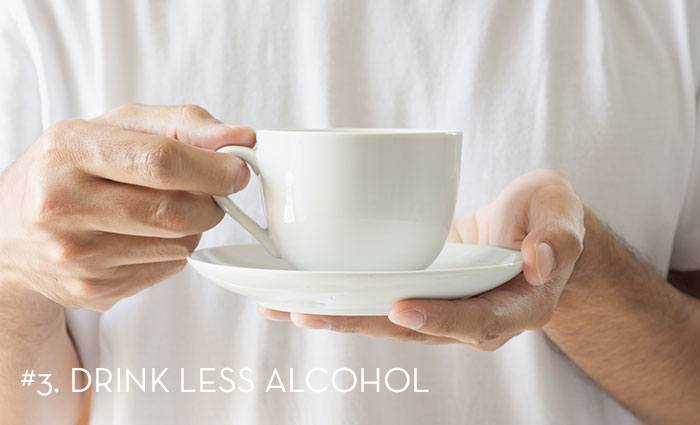
Drink Less Alcohol
It’s especially important to avoid more alcohol as the cold weather and holidays approach. All alcohol has empty calories (even the ones marketed as being free of carbs) and when combined with excessive eating around the holidays, it’s a one-two punch that will guarantee weight gain. We’re not saying don’t drink at all, just limit binge drinking and consider only drinking at mealtimes to help your liver process.

Minimize Artificial Sweeteners
This means limiting (or better yet, eliminating) sodas, energy drinks, candy, and all the toxins associated with them. If you want a treat, consider having chocolate that contains 80% cocoa or better yet sweet fruit like dates. We can’t stress this enough because, ultimately, artificial sweeteners fall into the category of really bad foods given their poisonous qualities.

Explore Your Sensitivity to the “Sour Eight”
The Sour Eight are wheat, corn, dairy, soy, sugar, eggs, alcohol, and peanuts and the majority of the population has some form of sensitivity to at least one of these. Sensitivities could range from full-blown allergies to mild discomfort. But by taking time to remove one of these from your diet for a month, you could avoid constipation, bloating, excess mucus, fatigue, headaches, water retention, and most shockingly of all, you could eliminate 5-15 pounds of water retention in your bowels!
Try it! Start with peanuts and see how you feel after a month. You may not notice a difference in which case move on to eggs and then work towards the others, which you’ll find are a little more difficult to eliminate as they’re so omnipotent. But ultimately isn’t your health and vitality worth it?
What is Mountain Trek?
Mountain Trek is the health reset you’ve been looking for. Our award-winning retreat, immersed in the lush nature of British Columbia, will help you unplug, recharge, and roll back years of stress and unhealthy habits. To learn more about the retreat, and how we can help you reset your health, please email us at info@mountaintrek.com or reach out below:



